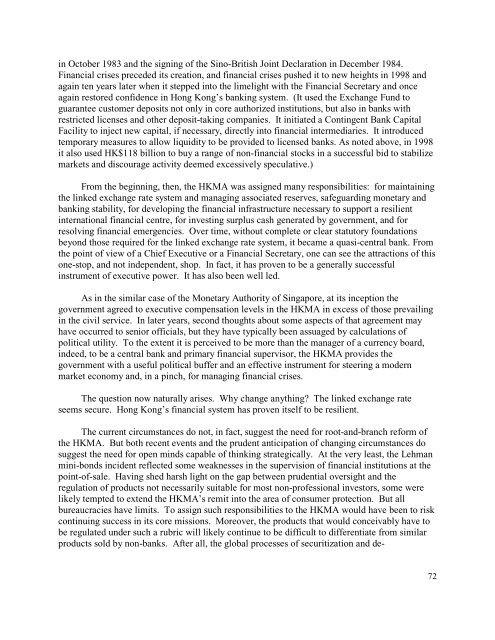Hong Kong's International Financial Centre: Retrospect and Prospect
Hong Kong's International Financial Centre: Retrospect and Prospect
Hong Kong's International Financial Centre: Retrospect and Prospect
You also want an ePaper? Increase the reach of your titles
YUMPU automatically turns print PDFs into web optimized ePapers that Google loves.
in October 1983 <strong>and</strong> the signing of the Sino-British Joint Declaration in December 1984.<br />
<strong>Financial</strong> crises preceded its creation, <strong>and</strong> financial crises pushed it to new heights in 1998 <strong>and</strong><br />
again ten years later when it stepped into the limelight with the <strong>Financial</strong> Secretary <strong>and</strong> once<br />
again restored confidence in <strong>Hong</strong> Kong’s banking system. (It used the Exchange Fund to<br />
guarantee customer deposits not only in core authorized institutions, but also in banks with<br />
restricted licenses <strong>and</strong> other deposit-taking companies. It initiated a Contingent Bank Capital<br />
Facility to inject new capital, if necessary, directly into financial intermediaries. It introduced<br />
temporary measures to allow liquidity to be provided to licensed banks. As noted above, in 1998<br />
it also used HK$118 billion to buy a range of non-financial stocks in a successful bid to stabilize<br />
markets <strong>and</strong> discourage activity deemed excessively speculative.)<br />
From the beginning, then, the HKMA was assigned many responsibilities: for maintaining<br />
the linked exchange rate system <strong>and</strong> managing associated reserves, safeguarding monetary <strong>and</strong><br />
banking stability, for developing the financial infrastructure necessary to support a resilient<br />
international financial centre, for investing surplus cash generated by government, <strong>and</strong> for<br />
resolving financial emergencies. Over time, without complete or clear statutory foundations<br />
beyond those required for the linked exchange rate system, it became a quasi-central bank. From<br />
the point of view of a Chief Executive or a <strong>Financial</strong> Secretary, one can see the attractions of this<br />
one-stop, <strong>and</strong> not independent, shop. In fact, it has proven to be a generally successful<br />
instrument of executive power. It has also been well led.<br />
As in the similar case of the Monetary Authority of Singapore, at its inception the<br />
government agreed to executive compensation levels in the HKMA in excess of those prevailing<br />
in the civil service. In later years, second thoughts about some aspects of that agreement may<br />
have occurred to senior officials, but they have typically been assuaged by calculations of<br />
political utility. To the extent it is perceived to be more than the manager of a currency board,<br />
indeed, to be a central bank <strong>and</strong> primary financial supervisor, the HKMA provides the<br />
government with a useful political buffer <strong>and</strong> an effective instrument for steering a modern<br />
market economy <strong>and</strong>, in a pinch, for managing financial crises.<br />
The question now naturally arises. Why change anything? The linked exchange rate<br />
seems secure. <strong>Hong</strong> Kong’s financial system has proven itself to be resilient.<br />
The current circumstances do not, in fact, suggest the need for root-<strong>and</strong>-branch reform of<br />
the HKMA. But both recent events <strong>and</strong> the prudent anticipation of changing circumstances do<br />
suggest the need for open minds capable of thinking strategically. At the very least, the Lehman<br />
mini-bonds incident reflected some weaknesses in the supervision of financial institutions at the<br />
point-of-sale. Having shed harsh light on the gap between prudential oversight <strong>and</strong> the<br />
regulation of products not necessarily suitable for most non-professional investors, some were<br />
likely tempted to extend the HKMA’s remit into the area of consumer protection. But all<br />
bureaucracies have limits. To assign such responsibilities to the HKMA would have been to risk<br />
continuing success in its core missions. Moreover, the products that would conceivably have to<br />
be regulated under such a rubric will likely continue to be difficult to differentiate from similar<br />
products sold by non-banks. After all, the global processes of securitization <strong>and</strong> de-<br />
72


